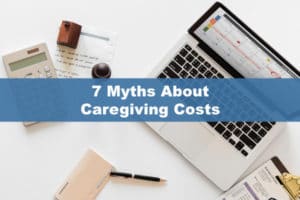Long Term Care Costs
Most Retirees Concerned About LTC Costs

Most Retirees Concerned About LTC Costs
“Seventy-two percent of retirees are concerned about long-term care expenses for assisted living services, nursing home care and home healthcare, according to a new national survey, making such expenses the most frequently cited spending concern by respondents.” — T. Rowe Price
Will you need to move in with your children someday for care? Have you talked to them about this?
Will your savings run out much faster than anticipated because you’re paying between $4,000 and $8,000 a month for care? And, this amount is what home care or assisted living facility care costs and is not enough to pay for a nursing home.
Have you considered addressing this but just keep putting it off? It does not get better or less expensive by waiting.
When I was 49, I purchased long-term care (LTC) insurance. I was active, healthy, and better lzooking than I am now that I am pushing 70. Why? I decided I did not want to worry about LTC when I retire. I wanted to get this out of the way so I could spend my money on travel and fun things. I did not want to be in the position of being afraid to spend because I might need that money for care some day.
It took some discipline to make that annual payment back then. In retrospect, it cost a lot less than premiums would be now had I waited. Besides, with the arthritis and diabetes I now have, it would be unlikely that I would be able to buy the insurance now.
Have you thought about being a burden to your adult children? Many years ago, women did not work outside the home and could care for parents. How many of your adult children in their prime earning years can afford to retire early or work part time so they can care for you?
I recently visited a friend my age in an assisted living facility. He never expected to be in such care at this age. He had planned on golfing, hunting, and traveling at this point in his life. We discussed the cost, and he knows exactly how long it will be before his savings run out as he dips in each month to make up the shortfall of his income.
Each year, fewer and fewer assisted living facilities accept Medicaid. Medicaid is a welfare program that will pay for LTC once you are completely impoverished (that is, you have less than $2000 to your name). Medicaid pays facilities only a fraction of what it costs to provide care, so they can’t remain viable if they accept Medicaid payment for residents. Can you lose money on every customer and make it up in volume? Of course not! Thus, you may get in, as long as you sign a document agreeing to being evicted when your money runs out.
On the other hand, nursing homes must accept Medicaid because they are required to if they accept Medicare payments for their rehabilitation care. Assisted living facilities do not provide services that Medicare reimburses, so they can deny services to Medicaid beneficiaries; more and more are doing so each year.
So, who will care for you when your health changes? The federal Department of Health and Human Services says that by the time we reach age 65, 70% of us will need care. Do you think you’ll be in the 30% who doesn’t?
Okay, now for some good news. Many people assume the insurance that pays for LTC is too expensive. That is because they do not realize most people need less of it than they initially suspect.
When care is needed, your life style will change considerably. How many vehicles will be in the household when only one of you can drive? You won’t be able to take trips to Branson, go on cruises, or enjoy Door County weekends. There will be no more golfing, snowmobiling, motorcycling, fishing or camping trips. Even going out for dinner may be too complicated, because it will be difficult to get in and out of the restaurant and use its bathroom.
When these lifestyle changes are taken into consideration, many people find they can contribute a portion of their income towards the costs of care. In addition, the interest or yield from investments can be used without needing to tap the principal. Together, these sources may cover half or more of the care costs, leaving only a small portion of the cost you need to cover with LTC insurance.
When you need smaller amounts of insurance than anticipated AND you apply when you are younger and have a good medical history means that you can have premiums much less than many expect. If you investigate with someone knowledgeable in how care is used, local costs of care, and how to choose appropriate coverage, you may find this can eliminate becoming part of the 72% of retirees who worry about this. How long do you want to kick this can down the road before you investigate this for yourself?
Romeo Raabe, LUTCF, LTCP can be reached at www.TheLongTermCareGuy.com or by calling (920) 884-3030. For over 25 years he has helped people find solutions for nearly any health or financial situation concerning LTC.
7 Myths About Caregiving Costs

There are some common misconceptions surrounding the caregiving costs, as well as the realities to expect.
This article by Rachel Hartman was published on line by U.S. News & World Report on December 12, 2018. It is an excellent overview of several common myths about caregiving costs. The link to the article is here.
The financial aspects of caring for an aging loved one are often a grey area. It can be difficult to predict upcoming health-related expenses and estimate how much help will be needed. Yet the costs of caregiving tend to run steep. The value of family and friend caregiving amounts to $470 billion each year, according to AARP Public Policy Institute report.
If you are currently providing care for an elderly relative or plan to do so in the future, filtering through the financial details as early as possible can save time and money later. Here are some common misconceptions surrounding the costs of caregiving, as well as the realities to expect.
Your loved one will stay at home and not have caregiving expenses.
Your aging relative may never move to an assisted living facility, but other care-related costs could still come up. “Many adult children assume responsibilities for their aging parent very gradually,” says Matt Stagner, senior special needs consultant for Voya Financial’s Voya Cares Program. “It could start with driving Mom to the bank or grocery store and accompanying her to regular doctors’ appointments.” There may be costs for home maintenance, such as cleaning, plowing snow or mowing the lawn. Eventually you may need to bring in skilled nursing support or in-home care. “Even if your loved one doesn’t ever reside outside of his or her own home, responsibilities like these define the role of a caregiver, and the costs can increase over time,” Stagner says.
All home help will be covered by insurance.
For assistance at home or nurse visits, it’s easy to assume health insurance or Medicare will pay for the costs. And in some cases, such as giving shots or checking blood pressure, you might find insurance provides coverage. However, in most instances, you’ll need to find other funds for daily help at home. “Health insurance and Medicare never pay for custodial care, which is the day-to-day sitting, “says Patrick Simasko, an elder law attorney and wealth preservation specialist at Simasko Law in Mount Clemens, Michigan.
You can quickly calculate how much help at home will cost.
The exact amount your loved one or family will spend on bringing in home assistance can vary greatly. “The actual cost of care depends on the intensity of the need and varies according to how much care is actually needed,” says Phyllis Ettinger, president of Royal Health Care Services in New York. “It also depends on whether or not a patient has long-term care insurance or any other form of long-term insurance, where they live and whether or not they qualify for Medicaid.” It can also vary based on the family situation. If some relatives help during the weekend or on certain days, you might only pay for a few hours of help during the week.
The cost of caregiving is only financial.
If you are spending hours every week caring for a loved one, you may face struggles in other areas of your life. “You can’t pour from an empty cup, but caregivers across the country are trying to do just that,” Stagner says. You might find you have limited time for other family and friends, sleep, doctor’s appointments or exercise. These can lead to non-financial costs such as increased stress, health problems of your own and the emotional drain of caring for an aging relative.
You can’t afford a caregiver, so you’re not going to get one.
Perhaps your loved one has few financial resources, or other family members are unable to help pay for professional care. It may still be beneficial to research what’s available. You could find that just a few hours a week make a big difference for your own health and also your loved one’s quality of life. The national median cost for a home health aide is $22 per hour, according to the 2018 Genworth Cost of Care Survey.
Caregiving won’t affect my finances.
Helping a loved one often involves extra physical demands, and these can impact your career over time. “We have seen caregivers work less hours, pass up promotions, change jobs or even leave the workforce,” says Brian Walsh, manager of financial planning at SoFi, a personal finance company. And if your relative lives with you, you could pay higher utility bills or have to remodel certain rooms of your home.
A conversation about finances can wait until care is needed.
If your loved one is currently in good health and living at home, it can still be prudent to set up a plan. That way, if a crisis such as a fall or an unexpected hospital visit happens, everyone is prepared. “Anyone who has tried to move quickly through the Medicaid application process or push through power of attorney documents in an emergency situation will tell you that conversations about how your parents will live out their lives should occur long before there are any physical or mental health issues,” Stagner says.
If talking about finances feels uncomfortable, consider starting with a few simple questions. You might ask for guidance for your own retirement. You can then listen to what resources your loved one has accumulated and suggests using, such as a health savings account or long-term care insurance. “Paying close attention to asset ownership and beneficiary designations are key steps in the process,” Stagner says. Also talk about the power of attorney. Ask who your relative would like to make medical and financial decisions if he or she is unable to do so.
* * * * *
Better yet, consider a plan on how to pay for caregiving costs when it becomes necessary. There is insurance one can purchase while healthy that will pay for care so nobody has to go broke and rely on welfare (Medicaid). Children will not have to decide which assets to sell first, second, etc.
There are even strategies for people already in care to protect some of their money for family. Come meet with an expert on Long Term Caregiving costs, such as Romeo Raabe, known as www.TheLongTermCareGuy.com in Green Bay, WI. Phone him at (920) 884-3030 to schedule a meeting and learn what options you have. You do not know what you do not know.
Happy Holidays – How is Grandma?

How is Grandma? Are bills piling up unpaid? Is hygiene slipping? Are they not eating as well as they should, or is the house unkempt?
While your family was together at Thanksgiving, was there evidence that older family members are not taking care of themselves as well as they could be or used to?
Perhaps your loved one is not driving as much as before, or perhaps should not be driving at all. Are bills piling up unpaid? Is hygiene slipping? Are they not eating as well as they should, or is the house unkempt?
It is never easy to meet with siblings and parents to talk about how and where they will be helped with future living arrangements. Then you check into costs at senior living facilities and wonder how can this possibly work.
Hello! My name is Romeo Raabe, and I am a long-term care (LTC) planner at www.TheLongTermCareGuy.com. I help families learn how to convert homes into income to pay for LTC facilities.
I help families navigate the federal Medicaid programs that can pay for LTC. I even have ways to help protect the money for family, rather than all going toward LTC costs.
If this discussion has started, or is about to, call me at (920) 884-3030 and let’s schedule a time to visit and see if I can help you and yours. It’s never too late and you don’t know what you don’t know.
What’s it Really Like Paying for Long-Term Care

Annual cost range is $18,720 for adult day-care services to $100,375 for a private room in a nursing home!
As written by Michelle Singletary and published in the Washington Post on November 26, 2018
One of my favorite Spock quotes from the Star Trek television series is, “Live long and prosper.” Who doesn’t want a long life, right?
But what if the longevity means spending down your money for long-term care? And that’s if you’ve been prosperous and have the funds to pay a facility or home health aide to care for you.
Genworth Financial recently released its 2018 Annual Cost of Care survey and found that the annual median cost of care now ranges from $18,720 for adult day-care services to $100,375 for a private room in a nursing home.
I asked readers to share their long-term care experiences, and here’s what they had to say:
“My mother had Alzheimer’s and was in a memory unit for two years,” wrote Chris Gonzales from California. “My dad has been in assisted living for two and half years and for the last two years has needed round-the-clock care. The cost, when my mother was alive, totaled $230,000 a year. The cost to care for dad is now $170,000 a year. This is in Fort Smith, Ark. My brother and I are very lucky that our parents lived below their means, saved, and did extremely well investing their money in the market, so money has not been an issue. We are also grateful for the ladies that watch over our father and consider ourselves extremely lucky to have people we can depend on as we both live out of state.”
“I managed the care of my mother (who had Alzheimer’s disease) from 1998 through 2006,” wrote Debbie Trice of Sarasota, Fla. “Even that long ago, the cost of her care approached $100,000 annually once she had to move from an assisted-living facility to a skilled nursing facility. The actual cost of long-term care goes way beyond the monthly or daily facility charges. Personal expenses (e.g., adult diapers, toiletries, laundry, haircuts) can be significant. I saved some money by purchasing diapers from a wholesaler and toiletries from a discount store and doing mother’s laundry myself. Medications cost more for residents in long-term care, too. Some states require that all medication, including over-the-counter items like aspirin and vitamins, be specially packaged by a pharmacist in blister packs — at extra cost, of course. Staffing is a critical issue. To keep their rates competitive, many facilities limit their staffing levels to the minimum required by law. But then some patients’ needs can’t be adequately addressed. I found it necessary to hire private duty aides to supplement facility staff for a few hours each day.”
Lane Beckham of New Jersey wrote, “Four years ago my wife (then 71) suffered a fall which led to numerous complications over the next year. She has since been bedridden going from a home hospital bed to a wheelchair. She can feed herself, converse, watch television and read catalogues, but that’s about it. We’ve had a 24/7 home health care aide since April 2015 at a current cost of $215 a day or $78,475 a year. A long-term care policy kicks in $100 a day but only for 5 years of benefit days.”
“My mother died two years ago and for the last two years of her life, she had progressively worsening dementia,”
One reader wrote. “We (mainly my sister) arranged for her to be cared for at her home. The cost was running at about $85,000 a year and that was two years ago! Why? At times, she was simply too much for one person to handle, so we often needed two people to stay with her. And while we went with the better-rated agencies, we still had problems with sitters stealing, using drugs, having friends over and even taking my mother out when they needed to run errands. What a nightmare.”
David Treece, an investment adviser and financial planner based in Miami Shores, Fla., has a client with Alzheimer’s who has a Genworth long-term care insurance policy, which so far has paid out about $323,000.
“I have learned nothing will ruin a retirement plan faster than long-term care expenses,” Treece wrote. “Try having to come up with nearly a third of a million dollars like my client if you don’t have coverage. It’s just unimaginable for most people. My biggest concerns for my clients are a group I call ‘the alones.’ These are people who have no spouse, no children, no close siblings and really nobody else. They can’t even name a beneficiary let alone someone to serve as a power of attorney or health-care surrogate. This group seems to be increasing as so many people never had children, are divorced or never married, or are estranged from family. Who is even going to help them? Our society isn’t really set up for this, and I don’t see any easy solutions.”
*****
How comfortable do you feel paying for care out of pocket when your health changes?
- Have you thought that Long-Term Care insurance would not be needed?
- Do you plan on spending down to Medicaid, a welfare program and then search for a place that will accept it – and you?
If you are concerned, contact www.TheLongTermCareGuy.com at (920) 884-3030 and schedule a time to investigate with someone who understands and can help you find a way to handle this!
Who is Going to Pay for Your Funeral?

Who is Going to Pay for Your Funeral?
Asking who is going to pay for your funeral might seem like a silly question–you probably have money in savings, a vehicle, a house, even life insurance. There should be plenty of money to pay this bill, right?
The problem is, you are gone, so now who has access to your assets?
Your Power of Attorney ends at the moment of your death. How your assets will be distributed and who has authority will all be determined in the probate process in the next few months. So, who will come up with the funds now to pay for the funeral? Even life insurance does not pay out for some time once claim forms are submitted.
Just recently, I received a call from a La Crosse funeral home who wanted to know how to get in touch with the Wisconsin Funeral Trust. This is the organization that funeral directors set up to hold prepayments for funerals. The association chose to invest the funds very aggressively and now only has money to pay out 65% of what people deposited. The funeral home that called me was caring for two individuals who had passed, and the home was trying to determine how much money the trust actually has for them. They called me is because they found me in an internet search. (If you Google “funeral trust Wisconsin”, my website comes up.) They hoped I could either help them or direct them to the correct place.
This shortcoming of the state funeral trust is important to those planning ahead for their end-of-life needs. I am a long-term care planner and, as such, include protecting funds set aside for funerals as part of my work. I help people set aside funds for their funeral using a licensed trust company who specializes in just this. The company that I use for this purpose is a licensed and bonded insurance company, required by law to retain adequate funds to cover claims. There is no cost to set up such a trust and the funds deposited earn interest. These funds are available immediately at death, even before a death certificate has been produced, to pay all the bills in full.
There is another important reason to fund a funeral trust –many people need long term care in the years leading up to their death. This can cost as much as $50,000 to $90,000 per year or more. If they did not plan in advance and purchase long-term care insurance to cover these bills, they may have to apply for a welfare program called Medicaid to pay for their care. Medicaid is a payer of last resort and will only cover long-term care expenses once you have spent down everything you own (house, car, checking, savings) to under $2000. You must also cash in life insurance before Medicaid pays for long-term care. This balance is not enough to pay for a funeral.
Medicaid does allow you to set aside money for funeral expenses, but only in an irrevocable burial trust account. Setting these up for people who did not plan for long-term care expenses has become a large part of my work.
Death happens to everyone. Don’t leave the bills for this to your children. Make sure the money is there AND accessible to them when it is needed.
Long-term care happens to 70% of adults who make it to age 65. What is your plan to pay for this care when your health changes?
For answers to either of these predicaments, reach out to Romeo Raabe at www.TheLongTermCareGuy.com or call (920) 884-3030 to schedule a time to investigate solutions. There is never a cost to investigate.
Observations from a Recent Hospital Stay

Nearly every one of the CNAs at a recent hospital stay started their careers in a long-term care (LTC) facility.
Recently, I was an inpatient in a hospital after having surgery. While there, I visited with a number of nurses and CNAs (certified nursing assistants) while they were caring for me. Nearly every one of the CNAs had started their careers in a long-term care (LTC) facility. The reasons these workers moved on to a hospital setting for work is the main problem with LTC today.
Caregivers (CNAs) are in very high demand and very short supply.
LTC workers especially are underpaid and overworked. They rarely receive merit or cost of living raises. The facilities that desperately need them are having a very difficult time making ends meet. This is because Medicaid, which pays for nearly half of all LTC in the United States, pays nursing homes significantly less than the cost of care.
Nursing homes which accept Medicare for rehabilitation care (their main source of revenue) must also accept Medicaid—the welfare program which pays for care when the patient cannot afford it. Thus, the nursing home has become the main place that will accept a person if he/she cannot pay for care in an assisted living facility. Assisted living facilities cost between $4000 and $8000 a month depending on care needs. Since they do not receive Medicare for rehabilitation care, they are not required to accept Medicaid, and many do not.
Most people cannot afford the monthly charges for long without LTC insurance.
The problem is that many people do not plan for care in later life, with investments or insurance that pays for LTC. Many of the residents in LTC facilities are on Medicaid, and most of them are in nursing homes. This is because the very nice assisted living facilities are rapidly deciding not to accept Medicaid because of its inadequate reimbursement for care.
Back to the CNAs I met in the hospital. While there is a desperate need for caregivers, those caregivers need a living wage, and many long-term care facilities are unable to provide that. So, they migrate to the hospitals who can pay them and provide benefits.
If you want to have good long- term care, in a place that appeals to you when your health changes, you need to have a plan to pay for that care or the odds may be good that a nursing home may be your only choice. Years ago, I purchased LTC insurance that will pay for the care I need, in a setting I will be happy in when that time comes. Will you?
For more information, browse all of our resources at www.TheLongTermCareGuy.com.
Debtors Prison: A throwback to generations ago

Wouldn’t you rather have the money to choose where you will live?
Debtors prison (long ago) was where you might end up until you could pay your bills or get someone to pay them for you. How does this relate to Long Term Care?
Long term care is very expensive, and most Americans have not prepared for it. When an assisted living facility costs $4000/month for hands on care or $8000/month for dementia care, most people go broke and turn to Medicaid.
Medicaid often pays less than the cost to care for you so many assisted living type facilities may decline to take you in if you cannot show an ability to pay for two years with money or LTC insurance.
Nursing homes are different. Much of their work is in short term rehab after a hospital stay which Medicare pays for. This they can make money on to offset what they lose on their residents living there on Medicaid.
Assisted living does not get such Medicare payments. Either you be able to pay for the care you need or go elsewhere. To keep their doors open they cannot lose money on every resident. If the nursing home accepts Medicare, then they must also accept Medicaid.
Thus, if you have lots of money, or insurance for LTC, you can go where you want. If you do not have money or LTC insurance, you might need to settle for a nursing home that may be your only choice due to finances. Now do you see the correlation to debtor’s prison?
Wouldn’t you rather have the money to choose where you will live? If you don’t have the money, investigate LTC insurance – while still healthy enough to get it. It’s just like car insurance, you have to have it before you suddenly need it.
Call TheLongTermCareGuy.com at 884-3030 and schedule a time to investigate.
Financial abuse against the elderly most often committed by those closest to them

While 68% of older investors believe that a stranger would be the likely perpetrator of financial exploitation against them, the reality is starkly different!
Quote: “While 68% of older investors believe that a stranger would be the likely perpetrator of financial exploitation against them, the reality is starkly different, according to Wells Fargo & Co., which released the results of its elder needs survey on Tuesday morning. Two-thirds of financial crimes against the elderly are committed by those who are closest to the victims, the survey found.”
Heirs often “help” parents by impoverishing them so as to collect Medicaid to pay for their long term care. They urge parents to give them the house long before care may be needed.
Often times the parents leave the homeowners insurance on a home they no longer own. When a claim happens they learn there is no coverage on the house or its contents because it is technically a rental house the occupants do not own.
Then when the parents need care, and apply for Medicaid, they learn that due to the woefully inadequate compensation to the care providers by Medicaid, they have a very difficult time finding a facility to accept them.
Later, when the children sell that house, they learn their cost basis was essentially zero and the entire selling price becomes taxable income to them.
I do not wish to have to live in a welfare facility that is losing money on my care, do you?
Do your parents? Do they realize the difficulty in gaining entrance when already qualified for Medicaid? When I travel, I do not stay at Motel 6, and I would never want to have to live in one either.
If the parents want to give some of their wealth to their children at the time care is needed, there is a way to do this through irrevocable burial trusts. This can move money to family without creating any penalty periods for Medicaid and still have access to the place they want to receive care. This is all part of the Long Term Care planning we do at www.TheLongTermCareGuy.com. Give us a call at (920) 884-3030 and let’s work out a plan for you and yours.
The Price Caregivers Pay

The price caregivers pay are high and the average number of hours spent as a caregiver between ages 45 and 54 is 25.8 hours per week. For caregivers age 65 to 74 it is 30.7 hours per week.
When couples weigh the price of whether one of them should take a career break to care for an aging parent or another family member, they usually make a pretty simple price calculation: they compare the earning power against the cost of a professional caregiver. There are a number of other costs to take into consideration with the Price Caregivers Pay.
Less will be paid into Social Security resulting in lower income in retirement for the rest of that person’s life. If out of the workforce long enough, Social Security disability might be restricted as well, should it be needed (caregivers in LTC facilities are lumped in with the most dangerous occupation for disability insurance).
They also face loss of work experience, meaning if they later return to work, it will be at a much lower income than they left work at. Training updates, industry changes and opportunities are left behind. Promotions and transfers may need to be declined by the remaining working spouse and must be taken into consideration. Then consider the amount of hours that may be spent in this new occupation.
The average age of a caregiver for a parent or other aging loved one is 49 years old. This is right in the middle of peak earning years and often is a far more expensive strategy than many think of.
The average number of hours spent as a caregiver between ages 45 and 54 is 25.8 hours per week. For caregivers age 65 to 74 it is 30.7 hours per week. This is a large chunk of time making part time work unavailable, especially when sudden changes of schedule are considered.
If this is something you are concerned about, and do not want to happen to you (or your children) why not consider LTC insurance to pay for such care? This can allow you to continue your occupation while spending quality time with the loved one instead of their becoming a burden.
LTC insurance requires a number of things taken into consideration, mainly how much of the bill can be paid out of pocket and how little insurance may actually be needed. Lifestyle changes when care is needed, along with less vehicles, toys, travel, etc. Thus more of available income than one might first imagine can be redirected towards the costs of care.
Interest in the nest egg can also help pay the price of care, without touching the principal. Thus only the shortfall may need to come from LTC insurance.
It is essential to investigate this type of insurance with someone who has the knowledge of how lives change when care is needed to arrive at an appropriate recommendation. At www.TheLongTermCareGuy.com we have been doing nothing but LTC planning for 25 years now. Give us a call at (920) 884-3030. We will be happy to help you investigate this subject.
5 Tips to Make Long Term Care Insurance Cost Less
To determine a price we need to first determine how much, or rather how little of it you need. We have been doing nothing but LTC planning now for 25 years and we’re happy to share with you 5 tips that will help you make Long Term Care Insurance cost less!

We have been doing nothing but LTC planning now for 25 years! Please let us help you!
Here are 5 Tips to Consider to Make Long Term Care Insurance Cost Less
- The number one tip is to take into consideration is how lifestyle will change when care is needed – and how your household budget changes as well. When someone needs care, they will most likely not be able to drive anymore which eliminates the need for a second (or third) vehicle. It also eliminates the need for the 4 wheelers, motorcycle, snowmobile, camper, boat, etc., etc. Thus a portion of income now used for fun things, can be redirected towards the costs of care. There will also be less fun activities such as golf, skiing, trips to Branson, cruises, football games, even less dining out if getting there and accessing their rest room becomes difficult.
- Number two is – you probably have some savings. Without touching the principal you can use the yield, or interest the account generates to pay some of the bills for care. Once all of this is taken into consideration most people find they need far less insurance to make up the shortfall than they initially thought.
- Number three is to be sure you are using local costs, the median cost surveys published nationally are a long way off from the actual costs of care in Wisconsin. The purpose of the insurance is thus twofold, to relieve family of the 24 hour a day job of caregiving, and to preserve assets so you do not spend down to Medicaid impoverishment. Medicaid is a government welfare program that will pay for LTC when you are completely impoverished. Facilities do not like to accept it as it pays far less than the cost to care for you. Thus you may be searching for a place to accept you if on Medicaid.
- Fourth is now that we have determined how much, or how little of it you need, your age will determine which company is your best choice. Rates vary considerably between companies. Some are a better deal at younger ages while others might be better if you are already in your 60’s (and can still qualify to purchase it).
- Lastly, the rate class you are assigned can make a large difference in pricing. What is standard with some companies is preferred rates with others. Once all of these things are determined, we can give you prices. In most cases the amount of money one person would spend for one year of care, if put into an interest bearing account – will earn enough interest to pay for insurance for both of a couple.
At TheLongTermCareGuy.com we have access to nearly all the insurance companies that offer this insurance. We can comparison shop for you. Expert guidance will save you money. Deal with experts who know this field and how to best help you plan. We can even help those who have been declined for this insurance in the past or are already in care (think of your parents). Give us a call at (920) 884-3030 to schedule a time to investigate options together.
